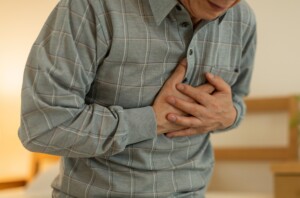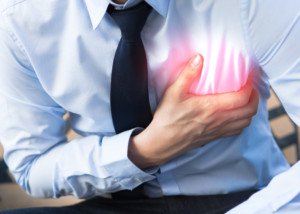
A sharp pain below the sternum is likely to have a cause other than GERD (gastroesophageal reflux disease).
This includes costochondritis (inflammation of the cartilage at the sternum and rib junction), a skeletal muscle spasm and an esophageal spasm—all benign situations.
A broken rib can easily cause sharp pain below the sternum (you’d likely make this connection due to a recent trauma in that region), as well as pleuritis.
These last two situations, when causing sharp pain under the sternum, often cause more pain upon inhaling.
“GERD is a condition of abnormal acid exposure in the esophagus; the classic symptoms include burning in the pit of the belly that regurgitates up to the mouth,” explains Jay Desai, MD, who specializes in colon cancer screening, upper endoscopy and consultative gastroenterology with New York Gastroenterology Associates.
“It can certainly cause pain below the sternum that can commonly be confused as a heart attack.
“If patients are at a high risk for cardiovascular disease, we recommend that they be seen by a cardiologist even if they have acid reflux disease. Typically the pain is vague and not specific to a size.”
“Size” refers to the perceived surface area of the pain or discomfort. A person with a heart problem can also, by coincidence, experience acid reflux.
Make sure that cardiac problems have been ruled out.
Unfortunately, sternum pain from GERD can be severe enough to make a person think they’re having a heart attack or a heart related episode such as angina from clogged arteries.
A tip-off that it’s a heart problem is that whenever the sternum pain occurs, you’re exercising or physically exerting yourself, and it disappears when you stop the activity.
A tip-off that it’s related to GERD is that it usually occurs, for instance, overnight when you’re lying in bed (and vanishes when you sit up), or shortly after a meal.
If you’re having sternum pain that’s related to GERD (your doctor has ruled out cardiac problems), then pay attention to when it occurs to see if there’s a pattern.
In fact, eating too rapidly can cause discomfort in the chest (arising from the esophagus).
Finally, a sudden but extremely brief “pain” in the chest or sternum region can actually be caused by the motility of bowel movements (the large colon is located close enough to the chest area for this to happen).

Board certified in internal medicine and gastroenterology, Dr. Desai provides a wide range of GI services including for bacterial overgrowth, constipation, acid reflux and GERD, IBS, incontinence and small bowel disease. Twitter handle: @NYGADocs
 Lorra Garrick has been covering medical, fitness and cybersecurity topics for many years, having written thousands of articles for print magazines and websites, including as a ghostwriter. She’s also a former ACE-certified personal trainer.
Lorra Garrick has been covering medical, fitness and cybersecurity topics for many years, having written thousands of articles for print magazines and websites, including as a ghostwriter. She’s also a former ACE-certified personal trainer.
.









































